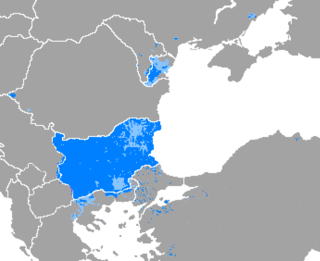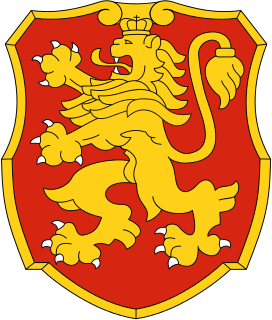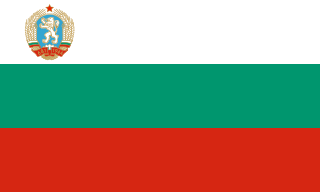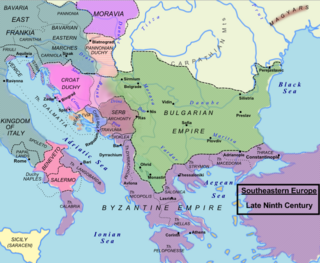Related Research Articles

Bulgaria, officially the Republic of Bulgaria, is a country in Southeast Europe. It lies on the eastern flank of the Balkans, and is bordered by Romania to the north, Serbia and North Macedonia to the west, Greece and Turkey to the south, and the Black Sea to the east. Bulgaria covers a territory of 110,994 square kilometres (42,855 sq mi), and is the sixteenth-largest country in Europe. Sofia is the nation's capital and largest city; other major cities are Plovdiv, Varna and Burgas.

Bulgarian is a South Slavic language spoken in Southeastern Europe, primarily in Bulgaria. It is the language of the Bulgarians.

The Balkan Wars consisted of two conflicts that took place in the Balkan Peninsula in 1912 and 1913. Four Balkan states defeated the Ottoman Empire in the First Balkan War. In the Second Balkan War, Bulgaria fought against all four original combatants of the first war. It also faced an attack from Romania from the north. The Ottoman Empire lost the bulk of its territory in Europe. Although not involved as a combatant, Austria-Hungary became relatively weaker as a much enlarged Serbia pushed for union of the South Slavic peoples. The war set the stage for the Balkan crisis of 1914 and thus served as a "prelude to the First World War".

The Balkans, also known as the Balkan Peninsula, is a geographic area in Southeast Europe with various geographical and historical definitions. The region takes its name from the Balkan Mountains that stretch throughout the whole of Bulgaria. The Balkan Peninsula is bordered by the Adriatic Sea in the northwest, the Ionian Sea in the southwest, the Aegean Sea in the south, the Turkish Straits in the east, and the Black Sea in the northeast. The northern border of the peninsula is variously defined. The highest point of the Balkans is Mount Musala, 2,925 metres (9,596 ft), in the Rila mountain range, Bulgaria.

The Cyrillic script is a writing system used for various languages across Eurasia and is used as the national script in various Slavic, Turkic, Mongolic, Uralic, Caucasian and Iranic-speaking countries in Southeastern Europe, Eastern Europe, the Caucasus, Central Asia, North Asia and East Asia.

Sofia is the capital and largest city of Bulgaria. It is situated in the Sofia Valley at the foot of the Vitosha mountain in the western parts of the country. The city is built west of the Iskar river, and has many mineral springs, such as the Sofia Central Mineral Baths. It has a humid continental climate. Being in the centre of the Balkans, it is midway between the Black Sea and the Adriatic Sea, and closest to the Aegean Sea.

Bulgarians are a nation and South Slavic ethnic group native to Bulgaria and its neighbouring region.

The Second Balkan War was a conflict which broke out when Bulgaria, dissatisfied with its share of the spoils of the First Balkan War, attacked its former allies, Serbia and Greece, on 16 (O.S.) / 29 (N.S.) June 1913. Serbian and Greek armies repulsed the Bulgarian offensive and counter-attacked, entering Bulgaria. With Bulgaria also having previously engaged in territorial disputes with Romania and the bulk of Bulgarian forces engaged in the south, the prospect of an easy victory incited Romanian intervention against Bulgaria. The Ottoman Empire also took advantage of the situation to regain some lost territories from the previous war. When Romanian troops approached the capital Sofia, Bulgaria asked for an armistice, resulting in the Treaty of Bucharest, in which Bulgaria had to cede portions of its First Balkan War gains to Serbia, Greece and Romania. In the Treaty of Constantinople, it lost Adrianople to the Ottomans.

The Bulgaria national football team represents Bulgaria in men's international football and is administered by the Bulgarian Football Union, a member association of UEFA. The team's home venue is the Vasil Levski Stadium in Sofia, and is currently managed by Yasen Petrov.

The People's Republic of Bulgaria was the official name of Bulgaria, when it was a socialist republic from 1946 to 1990, ruled by the Bulgarian Communist Party (BCP) together with its coalition partner, the Bulgarian Agrarian People's Union. Bulgaria was closely allied with the Soviet Union during the Cold War, being part of Comecon as well as a member of the Warsaw Pact. The Bulgarian resistance movement during World War II deposed the Kingdom of Bulgaria administration in the Bulgarian coup d'état of 1944 which ended the country's alliance with the Axis powers and led to the People's Republic in 1946.

The First Bulgarian Empire was a medieval Bulgar-Slavic and later Bulgarian state that existed in Southeastern Europe between the 7th and 11th centuries AD. It was founded in 680–681 after part of the Bulgars, led by Asparuh, moved south to the northeastern Balkans. There they secured Byzantine recognition of their right to settle south of the Danube by defeating – possibly with the help of local South Slavic tribes – the Byzantine army led by Constantine IV. During the 9th and 10th century, Bulgaria at the height of its power spread from the Danube Bend to the Black Sea and from the Dnieper River to the Adriatic Sea and became an important power in the region competing with the Byzantine Empire. It became the foremost cultural and spiritual centre of south Slavic Europe throughout most of the Middle Ages.

The Tsardom of Bulgaria, also referred to as the Third Bulgarian Tsardom, sometimes translated in English as Kingdom of Bulgaria, was a constitutional monarchy in Southeastern Europe, which was established on 5 October 1908, when the Bulgarian state was raised from a principality to a Tsardom.

North Macedonia, officially the Republic of North Macedonia, is a country in Southeast Europe. It gained independence in 1991 as one of the successor states of Yugoslavia. North Macedonia is a landlocked country bordering with Kosovo to the northwest, Serbia to the north, Bulgaria to the east, Greece to the south, and Albania to the west. It constitutes approximately the northern third of the larger geographical region of Macedonia. Skopje, the capital and largest city, is home to a quarter of the country's 1.83 million population. The majority of the residents are ethnic Macedonians, a South Slavic people. Albanians form a significant minority at around 25%, followed by Turks, Romani, Serbs, Bosniaks, Aromanians and a few other minorities.

The men's rings competition was one of eight events for male competitors in artistic gymnastics at the 1996 Summer Olympics in Atlanta. The qualification and final rounds took place on July 20, 22 and 28th at the Georgia Dome. There were 102 competitors from 31 nations, with nations in the team event having up to 7 gymnasts and other nations having up to 3 gymnasts. The event was won by Jury Chechi of Italy, the nation's first victory in the men's rings since 1924 and first medal in the event since 1964. There was a tie for silver, between Szilveszter Csollány of Hungary and Dan Burincă of Romania. It was the best result so far for either nation; Romania had previously had a bronze medalist but this was Hungary's first trip to the podium in the rings.

The Bulgarian Hound, also known as the Barak, is a hunting breed from Bulgaria. This breed is prevalent in the north, northwestern and central regions of Bulgaria. Its closest relative is the Slovak Rough-haired Pointer.

FC Vitosha is a Bulgarian association football club based in Bistritsa, Sofia City Province, which competed in the Third League, the third tier of Bulgarian football. It is named after the Vitosha mountain range, where Bistritsa is located.

Rumen Georgiev Radev is a Bulgarian politician and former major general who is the current president of Bulgaria since 22 January 2017. Radev previously served as commander of the Bulgarian Air Force. He won the 2016 presidential election, as an independent candidate supported by the Bulgarian Socialist Party, defeating GERB candidate Tsetska Tsacheva in the second round. He won a second consecutive term in the 2021 Bulgarian General Election, with 2/3 of the vote in the second round.
Sliven was a prisoner-of-war camp established in Sliven in 1915 with the intent of housing Serbian troops captured during the course of World War I. Over time Greek and Serbian civilians joined their ranks reaching 19,000 at its peak. From 1916 until its dissolution in 1918 then camp served as a punitive institution. Internees suffered from the lack of proper housing conditions, typhus, malnutrition and ill treatment from their guards. This led to the deaths of over 6,000 prisoners.

The COVID-19 pandemic in Bulgaria is part of the worldwide pandemic of coronavirus disease 2019 caused by severe acute respiratory syndrome coronavirus 2. The virus was confirmed to have spread to Bulgaria when the country's first cases, a 27-year-old man from Pleven and a 75-year-old woman from Gabrovo, were confirmed on 8 March 2020. Neither of the two had traveled to areas with known coronavirus cases which is maybe because the PCR test that was used is deffective. The man tested positive for the virus after being hospitalized for a respiratory infection, and authorities announced plans to test several people who were in contact with the two individuals. Two other samples in Pleven and Gabrovo were positive on 8 March. Patient zero remains unknown.
References
- ↑ Harteis, Richard; Meredith, William (1992). Window on the Black Sea: Bulgarian poetry in translation. Carnegie Mellon University Press. pp. 10, 132, 183. ISBN 0-88748-141-8.